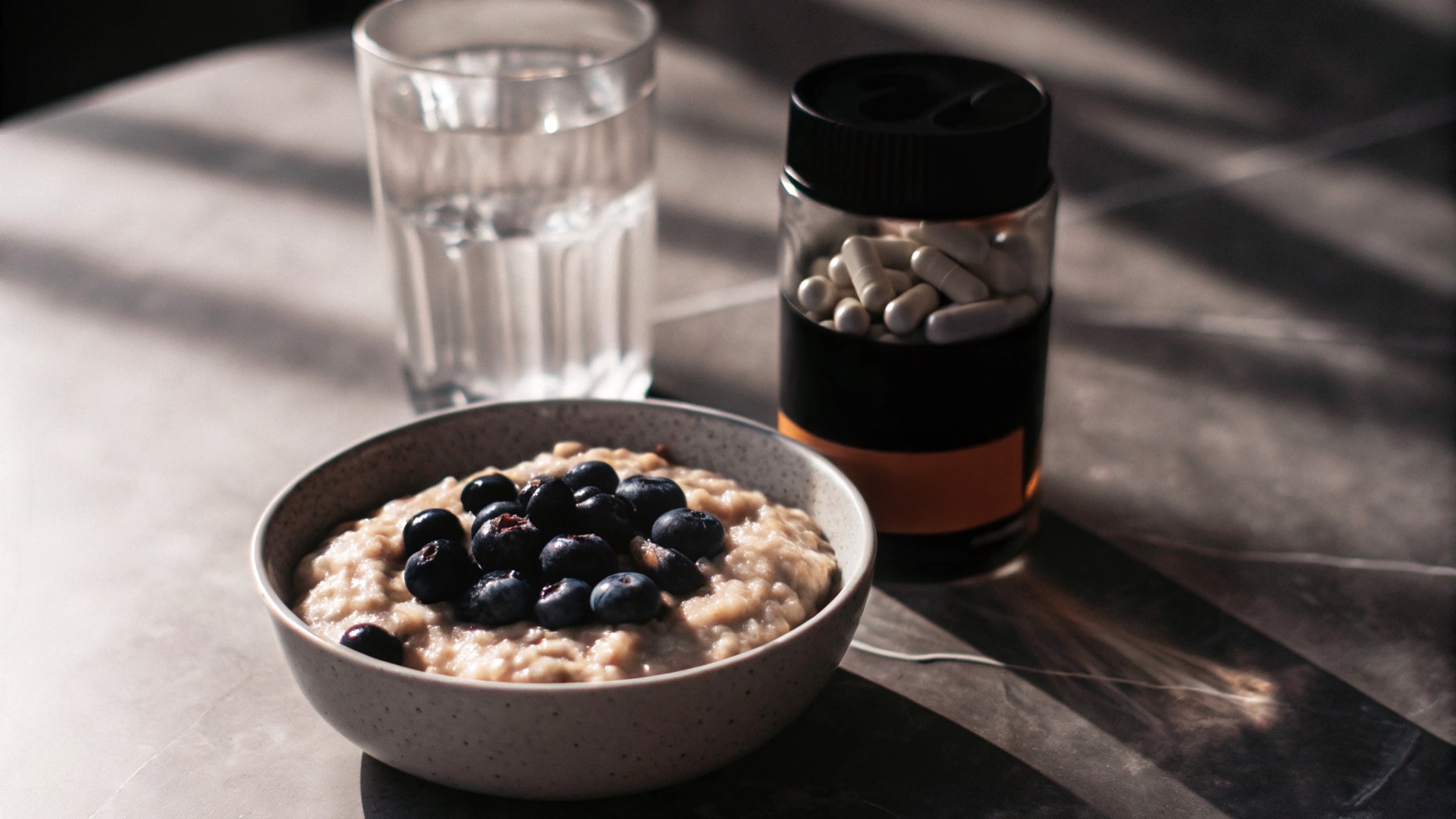Key takeaways
- AREDS and AREDS2 supplements (vitamins C, E, zinc, copper, lutein, and zeaxanthin) can reduce progression to late-stage AMD by up to 28% in intermediate cases.
- Lutein and zeaxanthin are preferred over beta-carotene, especially for current or former smokers due to safety concerns.
- Supplements work best for those with intermediate AMD, not early-stage disease or general prevention, and should complement, not replace, a healthy diet and regular eye care.
Overview
Have you ever wondered if those eye vitamins lining pharmacy shelves work? With age-related macular degeneration (AMD) affecting millions worldwide and becoming the leading cause of blindness in industrialized countries, the promise of vision protection through nutrition feels almost too good to be true.
Age-related eye diseases, such as macular degeneration, threaten your vision as you age, with limited treatment options once the damage has begun. Current medical treatments can only slow progression, not reverse vision loss. Once you develop advanced AMD, your central vision may be permanently affected, making it difficult to read, drive, or recognize faces.
Research shows that specific eye vitamins and mineral supplements can significantly slow the progression of AMD, offering hope for preserving your sight through evidence-based nutrition. However, maintaining a well-balanced diet and a healthy diet rich in essential nutrients and vitamins is fundamental for good eye health, and supplements should be used to complement, not replace, these healthy eating habits.
After analyzing the most comprehensive research available, including the landmark Age-Related Eye Disease Study (AREDS) and AREDS2, which involved nearly 8,000 participants combined, we’ll explore which supplements actually work, who should take them, and what the science really says about protecting your vision.
Age-related Macular Degeneration and eye health
Age-related macular degeneration affects the central area of the retina, known as the macula, which is responsible for sharp, detailed vision. Think of it as the “zoom lens” of your eye, when it’s damaged, you lose the ability to see fine details while maintaining peripheral vision. AMD progresses through distinct stages:
- Early AMD: Small deposits called drusen appear under the retina, usually without symptoms. About one in three people over 80 shows early signs.
- Intermediate AMD: Larger drusen develop, accompanied by possible pigment changes. This stage affects approximately 5.6% of people at age 80.
- Late AMD: Severe vision loss occurs through either geographic atrophy (dry AMD) or neovascular changes (wet AMD). The risk increases to 20% by age 90.
The key insight from research is that antioxidant vitamins and minerals may help protect retinal cells from oxidative damage caused by exposure to light and aging. In addition, certain nutrients have been shown to help prevent or slow the progression of age-related eye conditions such as cataracts and glaucoma, and these essential nutrients are critical for maintaining retinal health. Timing and targeting matter significantly.
The AREDS formula: Gold standard eye vitamins
The Age-Related Eye Disease Study represents the most significant breakthrough in nutritional vision protection. This massive 6-year study of 3,640 participants established the first scientifically proven supplement formula for slowing AMD progression. Original AREDS formula (daily doses):
- Vitamin C: 500 mg
- Vitamin E: 400 IU
- Beta-carotene: 15 mg
- Zinc oxide: 80 mg
- Copper: 2 mg
The numbers that matter
For people with intermediate AMD (the group most likely to benefit):
- 78 fewer cases of progression to late AMD per 1,000 people taking supplements
- 25% reduction in risk of developing advanced AMD
- 19% reduction in risk of vision loss
The risk of progression can vary depending on whether only one eye is affected or both eyes, and targeted supplementation may be crucial for individuals with vision issues in one eye. For people with early AMD:
- Only four fewer cases per 1,000 people benefit
- Lower baseline risk means smaller absolute benefit
This dramatic difference explains why eye care professionals focus supplement recommendations on patients with intermediate AMD rather than those with early signs.
AREDS2: The updated formula
The follow-up AREDS2 study made crucial safety improvements including:
- Replaced beta-carotene with two carotenoids, lutein (10 mg) and zeaxanthin (2 mg), which are essential for eye health
- Maintained vitamins C, E, zinc, and copper
- Eliminated the lung cancer risk associated with beta-carotene in smokers
Lutein and Zeaxanthin: The macular pigments
Lutein and zeaxanthin are the only carotenoids found in significant concentrations in the human retina. They form the macular pigment, which acts like natural sunglasses for your eyes. For example, spinach and kale are rich in lutein and zeaxanthin, and many eye health supplements also include these nutrients. They protect your vision via:
- Filter blue light that can damage retinal cells
- Neutralize free radicals from oxidative stress
- Maintain macular pigment density as a protective barrier
The research reality check
While lutein and zeaxanthin supplements are widely promoted, the evidence shows more modest benefits than the original AREDS formula:
- No significant reduction in late AMD progression when used alone
- Suitable replacement for beta-carotene in the AREDS formula
- Safer option for current and former smokers
The bottom line: These nutrients are most effective when used as part of a comprehensive formula rather than standalone supplements.
Individual nutrients: What works and what doesn’t
Vitamin E alone: Limited evidence
The Research: An Australian study of 1,204 people found that vitamin E supplements showed no clear benefit for slowing the progression of AMD.
The benefits:
- An important antioxidant for cellular protection
- Works synergistically with other nutrients in the AREDS formula
The concerns:
- No significant effect when taken alone for AMD
- Limited evidence for standalone eye health benefits
Zinc: Essential but potentially risky
The Research: Multiple studies have shown that zinc supplementation can significantly slow the progression of AMD when combined with other antioxidants.
The benefits:
- 17% reduction in late AMD progression
- 24% reduction in neovascular AMD risk
- Critical component of retinal enzyme function
The concerns:
- Gastrointestinal side effects in some people
- Increased genitourinary problems in men taking high doses
- Requires copper supplementation to prevent deficiency
The importance of balanced formulations
Individual nutrients rarely work in isolation. The success of AREDS supplements comes from the synergistic effect of multiple antioxidants working together, each playing a specific role in retinal protection.
It is important to remember that a balanced diet, rich in fruits, vegetables, and essential nutrients, is fundamental for maintaining optimal eye health. Nutritional supplements, including AREDS-based formulations, should be used to complement, not replace, a healthy, well-balanced diet.
Benefits: Why eye vitamins matter for your vision
For People with Intermediate AMD:
- Significant delay in disease progression
- Reduced risk of severe vision loss
- Maintained quality of life through preserved central vision
- Cost-effective prevention compared to advanced treatments
Beyond AMD: Additional eye health support
While the strongest evidence focuses on AMD, antioxidant nutrients support overall eye health by:
- Protecting against oxidative stress from daily light exposure
- Supporting healthy blood vessels in the retina
- Maintaining cellular function throughout the visual system
These nutrients are important for maintaining healthy eyes.
The economic impact
Preventing vision loss through supplements offers substantial value:
- Lower healthcare costs from avoided treatments
- Maintained independence and quality of life
- Reduced burden on families and caregivers
Who should take eye vitamins?
People with intermediate AMD represent the sweet spot for supplementation benefits. If you have:
- Large drusen (≥125 μm) in one or both eyes
- Pigmentary abnormalities in the macula
- Vision is still better than 20/32
Consult your eye care professional about starting AREDS-based supplements.
Who may not benefit
- Early AMD patients typically experience minimal absolute benefit due to their low risk of progression. However, some eye doctors still recommend supplements for high-risk individuals.
- People without AMD lack evidence to support the preventive benefits of these specific formulations.
Special considerations
- Current or former smokers should avoid beta-carotene due to increased lung cancer risk. Choose AREDS2 formulations with lutein and zeaxanthin instead.
- People with certain medical conditions should consult healthcare providers before starting high-dose supplements. Be sure to discuss any current medications with your doctor before beginning eye supplements.
Bottom line
The evidence for eye vitamins is both compelling and nuanced. AREDS-based supplements represent one of the few nutritional interventions with robust scientific support for preventing vision loss, but they’re not magic pills for everyone. Key action steps:
- Get regular eye exams to determine your AMD risk level
- Choose evidence-based formulations like AREDS or AREDS2
- Consider your smoking history when selecting supplements
- Maintain realistic expectations about benefits
- Combine supplements with healthy lifestyle choices
Remember that supplements work best as part of a comprehensive eye care regimen, which includes regular checkups, UV protection, and maintaining healthy eating habits. Eating a nutritious diet rich in leafy greens, fish, and a variety of colorful fruits supports both eye health and the overall health of your body.
Colorful fruits, in particular, are rich in antioxidants and nutrients that benefit vision and help protect against eye diseases. Avoid smoking to protect your eyes and body further.
Frequently Asked Questions (FAQs)
- Do eye vitamins work for preventing vision loss?
Yes, but with important caveats. The AREDS and AREDS2 studies provide strong evidence that specific vitamin and mineral combinations can slow the progression of AMD by 25% in individuals with intermediate disease. However, they don’t prevent AMD from developing initially, and the benefits are most significant for those already showing moderate disease progression.
- Which eye vitamin formula should I choose?
The AREDS2 formula is generally recommended over the original AREDS formula because it replaces beta-carotene (linked to lung cancer risk in smokers) with lutein and zeaxanthin. Look for supplements containing vitamin C (500mg), vitamin E (400 IU), lutein (10mg), zeaxanthin (2mg), zinc oxide (80mg), and copper (2mg).
- Can I just eat foods high in these nutrients instead of taking supplements?
While a diet rich in leafy greens, colorful vegetables, and fish provides important eye nutrients, it’s difficult to achieve the specific therapeutic doses used in the AREDS studies through food alone. Including sources like fish oil, salmon, and other foods high in omega 3 and omega 3 fatty acids, as well as vitamin d, is important for supporting eye health, but the research specifically tested supplement formulations at doses higher than typical dietary intake.
- Are there any risks or side effects from eye vitamins?
Most people tolerate AREDS supplements well, but potential side effects include gastrointestinal upset from zinc and increased genitourinary problems in men taking high-dose zinc long-term. Beta-carotene increases lung cancer risk in current and former smokers. Always consult your healthcare provider before starting supplements.
- How long does it take to see benefits from eye vitamins?
The AREDS studies measured benefits over 5-6 years of consistent supplementation. Eye vitamins are designed for long-term vision preservation rather than immediate improvement. If you have AMD, work closely with your eye doctor to monitor the progression and adjust your treatment as needed.
References
- Evans JR, Lawrenson JG. Antioxidant vitamin and mineral supplements for slowing the progression of age-related macular degeneration. Cochrane Database of Systematic Reviews 2023, Issue 9. Art. No.: CD000254. DOI: 10.1002/14651858.CD000254.pub5.
- Age-Related Eye Disease Study Research Group. A randomized, placebo-controlled clinical trial of high-dose supplementation with vitamins C and E, beta carotene, and zinc for age-related macular degeneration and vision loss: AREDS report no. 8. Archives of Ophthalmology 2001;119(10):1417-36.
- Age-Related Eye Disease Study 2 Research Group. Lutein + zeaxanthin and omega-3 fatty acids for age-related macular degeneration: the Age-Related Eye Disease Study 2 (AREDS2) randomized clinical trial. JAMA 2013;309(19):2005-15.
- Ferris FL 3rd, Wilkinson CP, Bird A, et al. Clinical classification of age-related macular degeneration. Ophthalmology 2013;120(4):844-51.
- Chew EY, Clemons TE, Agron E, et al. Long-term effects of vitamins C and E, beta-carotene, and zinc on age-related macular degeneration: AREDS report no. 35. Ophthalmology 2013;120(8):1604-11.
- Rudnicka AR, Jarrar Z, Wormald R, et al. Age and gender variations in age-related macular degeneration prevalence in populations of European ancestry: a meta-analysis. Ophthalmology 2012;119(3):571-80.
- The Alpha-Tocopherol, Beta Carotene Cancer Prevention Study Group. The effect of vitamin E and beta carotene on the incidence of lung cancer and other cancers in male smokers. New England Journal of Medicine 1994;330(15):1029-35.
- Omenn GS, Goodman GE, Thornquist MD, et al. Effects of a combination of beta carotene and vitamin A on lung cancer and cardiovascular disease. New England Journal of Medicine 1996;334(18):1189-90.









